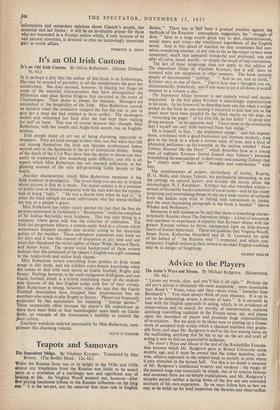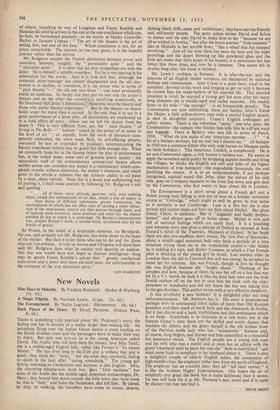Advice to the Players
The Actor's Ways and Means. By Michael Redgrave. (Heinemann. 10s. 6d.) "LEARN yer words, dear, and you'll feel it all right." Per14ps the old pro's advice is ultimately the most acceptable ; more reasonable than Rossi 's " Voice, voice and then—more voice," homelier than Bernhardt's " You must always think of your pleasure. It is up to you to be demanding, severe, a person of taste." It is certainly in tune with the English approach to acting, which, in its avoidance of conservatism and its search for novelty of interpretation, eschews anything resembling tradition in the French sense, say, and places upon the shoulders of player and producer huge responsibilities of re-creation. But we seem to be closer now to putting up a frame- work of accepted style within which a classical tradition may gradu- ally form, and since Mr. Redgrave is well to the fore among those on the scaffolding, anything that he has to say on the art and craft of acting is sure to find an appreciative audience.
The Actor's Ways and Means is the text of the Rockefeller Founda- tion lectures which Mr. Redgrave gave at Bristol University some months ago, and it must be owned that the rather tentative, crab- wise, allusive approach to the subject tends to mystify in print where it may stimulate in the lecture hall. Yet this is no doubt a measure of Mr. Redgrave's intellectual honesty and modesty : the magic of the painted stage may essentially be simple, but of its relative failures and successes there are no simple explanations, and Mr. Redgrave 's ' scruples permit neither a laying down of the law nor any extended accounts of his own experience. So we must follow him as best we may as he holds up for brief inspection the theories and observatitns of others, travelling by way of Longinus and Fanny Kemble and Stanislavski until he arrives in the end at the one conclusion which can, he feels, be formulated precisely—in the words of Harley Granville- Barker to Jacques Copeau : " The art of the theatre is the art of acting, first, last and all the time." Which conclusion is not, for an actor, remarkable. The interest, as one may guess, is in the hopeful journey rather than the arrival.
Mr. Redgrave accepts the French distinction between acteur and corned/en, between, roughly, the " personality actor" and the " character actor." It is clear that his first sympathies are with the latter. He is himself a notable corned/en. Yet he is not sparing in his admiration for the acteur. And it is true still that, although the romantic actor-manager has almost disappeared and the old star- system is in decline, or transition, it is the acteur who in terms of " pure theatre "—" the old one two three "—can most profoundly excite an audience. In theory one may put on one side the acteur's theatre and on the other the comedien'o, satisfying respectively, in Sir Desmond McCarthy 's distinction, t those who love the theatre and those who prefer literary experience." But in the theatre no theory holds water for more than a second. In the end, that is to say in a great performance of a great play, all distinctions are swallowed up in a total effect of unity. ,(How can we tell the dancer from the dance ?) This is very different from, say, the " pure theatre " of Irving in The Bells—"' hokum 'raised by the power of an actor to the level of art " ; or, equally, from the work of literature com- petently embodied, the word made flesh, by self-effacing players, overawed by text or overruled by producer, communicating the literary experience (which may be great) but little enough else. What we constantly hope for in the theatre (when the play in performance has, in the widest sense, some sort of genuine poetic quality : the naturalistic stuff of the contemporary commercial theatre allows neither acteur nor comedien any scope) is a translucency which.com- pletely reveals, without distortion, the author's intention, and which gives to his words a richness like the richness added to oil paint by a clear, clean varnish. Since this is a banal and unflattering way of putting it, I shall make amends by following Mr. Redgrave 's suit and quoting : " . . . all of them, voice, attitude, gestures, veils, were nothing
more, round this embodiment of an idea, which a line of poetry is . . . than layers of different substances, grown translucent, the interpolation of which has the effect only of causing a richer refrac- tion of the imprisoned, central ray that pierces through them, and of making more extensive, more precious and more fair the matter purified by fire in which it is enshrined. So Berma's interpretation was, around Racine's work, a second work, quickened also by the breath of genius."
So Proust, in the midst of a serpentine sentence, on Bernhardt. No one, and certainly not Mr. Redgrave, has come closer to the heart of the matter. But then it is for those who can to do and for those who can't to criticise. A visit to Antony and Cleopatra will show how well Mr. Redgrave does what he cannot well describe or analyse. Not that one would have him begirt to distrust intelligence—long may he ignore Fanny Kemble's advice that " greater intellectual cultivation and a purer and more elevated taste, are unfavotirable to the existence of the true theatrical spirit."
IAIN HAMILTON

































 Previous page
Previous page